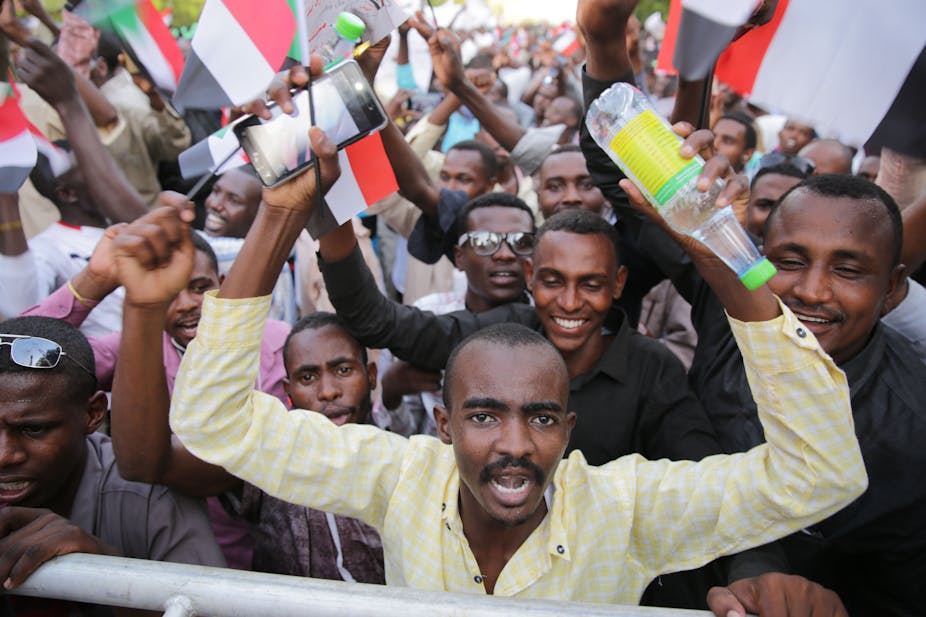The Peace and Security Council of the African Union (AU) has suspended Sudan from all the organisation’s activities “until the effective establishment of a civilian-led Transitional Authority”.
It also threatened to impose punitive measures on individuals and entities obstructing the establishment of a civilian-led transitional authority. The AU has given the Sudan Transitional Military Council, which orchestrated the overthrow of Omar al-Bashir in April, a 60-day deadline to do so.
The AU’s suspension followed the forceful dispersal of the month long sit-ins. The military action resulted in the death of more than a hundred protesters.
Prior to the killings, the Transitional Military Council had cancelled all tentative agreements with the Forces for the Declaration of Freedom and Change, the coalition negotiating on behalf of the protesters. It had also suspended negotiations, and announced plans to hold elections within nine months.
The Chairperson of the AU Commission as well as some western powers condemned the attacks on civilian protesters. There have also been calls for an independent investigation and restraint.
The killings signified a lack of progress in the establishment of a civilian-led transitional government. It also showed the reluctance of the military council to hand over power. This had been set as a precondition by the AU Peace and Security Council for delaying the full suspension of Sudan, which is normally immediate.
Complex
The AU declared the removal of long time leader Al-Bashir in April a coup d’état. But it took cognisance of the legitimacy of the popular protests that preceded the military intervention. As a result, it granted the Military Council an initial two weeks to establish a civilian-led transitional authority. The period was subsequently extended by up to 60 days.
The circumstances that justified initially granting the Transitional Military Council the benefit of the doubt have vanished with the deadly breakdown. The AU has justifiably cut the grace period short. Any other response would have undermined its long-established norm and practice against military takeovers and the primacy of civilian rule.
The AU has traditionally immediately suspended countries experiencing coups d’etat. This has been in line with the Lome Declaration of 2000. But responses to the military take overs in Burkina Faso in 2014, Zimbabwe in 2017 and Sudan in 2019 showed the challenges that tail-end military takeovers in support of popular uprisings present.
The engagement in Burkina Faso was a remarkable success. The AU gave the military an ultimatum to handover power to a civilian authority. This was complied with and underpinned the approach in Sudan. But, in Sudan’s case it’s failed so far.
Nevertheless, this need not discourage the AU from following similar approaches in the future. This could involve suspension that isn’t immediate, particularly where the military sides with popular protesters against authoritarian leaders.
In granting time for transitions to civilian rule, the AU has resorted to creative flexibility. This recognises the legitimacy of popular opposition to authoritarian rule. It has attempted to do this without undermining its zero-tolerance policy against military takeovers.
This approach also shows its commitment to prioritising engagement over confrontation. It ensurs the swift transfer of power from military to a civilian-led authority.
Suspension but not disengagement
In condemning the killing of civilians, the AU Chairperson affirmed the determination to engage and support the Sudanese people. Similarly, the Peace and Security Council noted that the
Sudanese stakeholders are the sole authors of their destiny.
The Council opposes any external interference. This is presumably in reference to allegations of support for the Military Council from Egypt, Saudi Arabia and United Arab Emirates.
This emphasis on Sudanese ownership of the transition underlines the primacy of African-led initiatives, through the AU and Intergovernmental Authority for Development. And, it calls for engagements to be scaled up to resolve the crisis. Hence the Peace and Security Council emphasised the mobilisation of
all the Sudanese stakeholders to dialogue, with a view to speedily establish a civilian-led Transitional Authority.
It also asked the Chairperson of the AU Commission to do everything possible to help facilitate dialogue among the principal Sudanese stakeholders. The military has since called for the resumption of talks. The initial response from the representatives of protesters was to reject this call.

The challenge now is to convince protesters that their cause is not all lost. This may require securing clear concessions from the military. And an affirmation that it’s committed to a civilian-led transition.
On this score, Sudan’s suspension could provide useful leverage.
This policy of suspension while continuing engagement is necessary to enable a relatively swift transition to civilian rule. Nevertheless, facilitating dialogue may be insufficient to break the impasse. The establishment of a transitional government is a tremendous exercise in institutional and (interim) constitutional design.
Continental help
Sudan’s Interim Constitution, adopted in 2005, has been suspended following the military takeover in April 2019. This means that a transitional constitutional framework is necessary to legitimise the continuing exercise of power. The military council has already released a draft constitutional document it wants to have as the basis for a transitional government. This was in response to an initial draft from the representatives of protesters. But agreement on the details of a framework has so far been elusive. Talks were deadlocked before demonstrators were killed this week.
As ultimate expressions of sovereign decisions, constitutional choices must be made by Sudanese stakeholders and representatives of the people. Nevertheless, the negotiators can benefit from African and global expertise and experience. This could expand the horizon of alternatives and improve the chances for compromise.
The planned AU Facilitation Team should include prominent facilitators and political personalities. In addition, it should include a select group of constitutional experts.
The challenges presented by events unfolding in Sudan provide a great opportunity for the AU to refine and consolidate its approach to supporting countries in crisis. This is particularly true when the situation involves constitutional reform.

